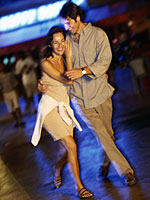We've all taken one pain reliever too many or not finished a round of antibiotics. But how bad are these mistakes, really? The answers, and what you should know for next time.
Oops! I didn't finish a prescribed course of antibiotics.

It's tempting to stop taking the medication once you start feeling better, but just because you don't feel sick anymore doesn't mean all the bacteria are completely wiped out. And you're more likely to get sick again. Not taking every last pill is also a mistake because you're contributing to the problem of antibiotic resistance. Here's why: In the first few days, the drug gets rid of only the weakest germs. By not finishing the full round, you're leaving behind the strongest strains, which may then become resistant to the most commonly used antibiotics.
Find out 10 surprising facts about orgasms.
What To Do: If you realize within two days that you didn't finish, start taking the medication again until you're done with the course. But if it's been a week or more, don't bother; by then the bacteria that are left may have mutated and you'll only be encouraging resistance. If you stopped taking the medicine because it gave you bad side effects like nausea or diarrhea, try taking it with food (as long as the directions don't say not to). If that doesn't help, call your doctor, who may be able to prescribe a different medication or alter your dose.
Good To Know: Taking antibiotics can also kill some of the "good" bacteria that are normally in your digestive tract, and this can cause side effects like diarrhea and stomach discomfort. While you're on the medication, counteract this by eating yogurt with active bacterial cultures or taking a probiotic supplement. Antibiotics can also cause yeast infections, since they can upset the pH balance in your vagina. If you're prone to them, ask your doctor for a prescription cream along with the antibiotics prescription. Photo: Jordan McCullough/Woman's Day
Oops! I used a cotton swab to clean my ear and now it hurts.

You've most likely scratched your ear canal—it will probably heal on its own. If it feels like something is stuck, you may have just pushed some earwax farther in. The chance of a permanent problem is rare, but it is possible to puncture your eardrum (which is painful), says Ilaaf Darrat, MD, in the department of otolaryngology–head and neck surgery at Henry Ford Hospital in Detroit.
What To Do: It's a good idea to see your doctor or an ear, nose and throat doctor (ENT) no mattter what. If you scratched any part of your ear and developed an infection, your doctor may prescribe antibiotic ear drops. And if something like wax or a piece of cotton is stuck, the doctor (ideally an ENT) will, of course, carefully remove it. Depending on your symptoms, you may also need to get a hearing test. If you've ruptured your eardrum (meaning there's a hole in it), it will most likely heal on its own, but your doctor may need to check it regularly just to make sure. In the rare case that it doesn't heal or you have a facial nerve injury and/or severe hearing loss, you may need to have surgery.
Good To Know: There's really no need to clean the inside of your ears. Earwax actually helps keep dust and debris from getting into your eardrum. But if your ears are itchy or otherwise bothering you, try using over-the-counter ear drops like Debrox, which can dissolve and dislodge the wax, says Dr. Darrat. Or make your own drops by mixing equal parts hydrogen peroxide and warm tap water. Tilt your head to one side and, using a medicine dropper, put five drops in the ear that faces up. Wait 1 to 2 minutes to let the wax soften, then tilt your head the other way so the fluid comes out into the sink or a washcloth. Repeat on the other side. You can do this as often as once a week, she says. Photo: Getty Images
Oops! I forgot to take my birth control pill.

Missing one pill usually isn't a big deal, as long as you make up for it the right way, says Jessica Shepherd, MD, assistant professor of obstetrics, gynecology and women's health at the University of Louisville School of Medicine.
What To Do: If you're on a combined progesterone/estrogen pill (such as Ortho Tri-Cyclen or Seasonique), take it as soon as you remember (it's OK to take two in one day). But you can only do this twice in a row before you risk getting pregnant. If you take a progesterone-only mini-pill (like Micronor or Ovrette) and realize within 3 hours of your usual pill-popping time that you forgot, just take the pill immediately. If it's outside the 3-hour mark, take it when you remember, and use backup contraception (condoms or spermicide) for the next week. The mini-pill has lower levels of hormones, so going too long without it could cause you to ovulate. (Birth control pills prevent pregnancy by stopping ovulation.)
Good To Know: If you often forget to take your pill, talk to your doc about a form of birth control that you don't have to remember daily. Good options are the vaginal ring (you change it monthly) and intrauterine devices (IUDs), which can
last up to 12 years.
Oops! I took Tylenol (acetaminophen) for a headache, and realized later that I'd already taken a cold medicine that contains the same thing.

Double dosing is all too easy to do, since hundreds of over-the-counter cough and cold medications and even sleep aids contain acetaminophen. It's better to avoid the combo formulas and instead take individual medications to treat your specific symptoms, says Sandra Fryhofer, MD, an internist in Atlanta and past president of the American College of Physicians. (For example, if you've got a headache and a runny nose, take a pain reliever and an antihistamine separately.) Consistently taking more than the amount recommended on the package could potentially damage your stomach, liver or other organs.
In the case of acetaminophen, if you take too much just once, you'll probably be OK, but doing it regularly can be toxic to your liver. (If you're popping acetaminophen often for weeks on end, check in with your doctor, who may recommend or prescribe a different drug that may be more effective.) The most an adult should take in a day is 4,000 mg, or four doses of 1,000 mg each.
What To Do: To be safe, don't take any more medications for the rest of the day or night. It's unlikely that you've overdosed from a one-time slip-up, but if you've recently upped your intake overall, pay close attention to how you're feeling. Signs of liver damage can take time to appear, and it's easy to mistake early symptoms (loss of appetite, nausea and vomiting) for something else, like the flu. Call your doctor or poison control center right away if you do feel sick. However, if you think you've taken 4,000 mg of acetaminophen or more in one day, make that call ASAP even if you don't have any symptoms; you may need medication to prevent serious liver damage.
In the future, before you take any OTC cough and/or cold remedy or sleep aid, check the active ingredients list carefully and make sure you don't take anything else that contains the same things.
See what your drugstore pharmacists wishes you knew.
Good To Know: If you regularly drink alcohol, taking even the dose that's recommended on the package could be harmful, since alcohol also taxes your liver, says Dr. Fryhofer. A maximum dose of 2,600 mg a day is safer if you do drink alcohol often, but in that case, talk to your doctor about which pain reliever would be best for you to use.
Also, take note that APAP is an abbreviation for acetaminophen sometimes used on OTC drug labels. Be sure to look for it when you're checking for acetaminophen content. Photo: Stephen Smith/Getty Images
Oops! I left my tampon in overnight.

Don't panic—chances are you won't get toxic shock syndrome (TSS), a rare but serious infection that causes fever, muscle aches, vomiting and diarrhea, which results from a buildup of bacteria in the tampon and your vagina. However, you may get bacterial vaginosis or a yeast infection, especially if you have a tendency to get them. The general rule of thumb is to change your tampon every 6 to 8 hours, says Dr. Shepherd. But you'll most likely be fine, even if the tampon has been in for a little longer than 8 hours.
What To Do: Remove the tampon ASAP and use pads for the rest of your period to be sure that any harmful bacteria are flushed out. For the next few days, watch for symptoms of infection, including nausea, vomiting, fever, muscle aches, discharge or diarrhea. Call your doctor right away if you notice any of these—you may need an antibiotic.
Eat these eight foods to live longer.
If you're prone to bacterial infections, consider only using regular (not super or overnight) tampons. TSS can happen with any size tampon, but it's more likely with larger ones because they can cause more damage to the vaginal wall, which will make it more vulnerable to a bacterial infection, says Dr. Shepherd.
Good To Know: TSS is less common these days, thanks to changes in the materials used to make tampons. The TSS rate peaked in 1980 with 890 cases in the U.S., but experts now estimate that it's about 1 or 2 cases per 100,000 women between ages 15 and 44.
Not sure if it's an oops or an emergency?Many drugstore chains like Walgreens, CVS/pharmacy and Walmart have drop-in medical clinics staffed by nurse practitioners, physician's assistants and sometimes doctors. Most health insurance companies also have a 24/7 nurse hotline (check the back of your card or the company's website for the number). Don't have insurance? Go to FindAHealthCenter.HRSA.gov and type in your address to find a federally funded clinic near you.
Denise Schipani is a freelance writer who specializes in health, fitness, relationships and parenting.Article originally appeared on WomansDay.com.
You Might Also Like:
The Best Sex Positions for Every Situation
All-Natural Ways to Fight Bloating
8 Calorie-Burning Myths Debunked










































